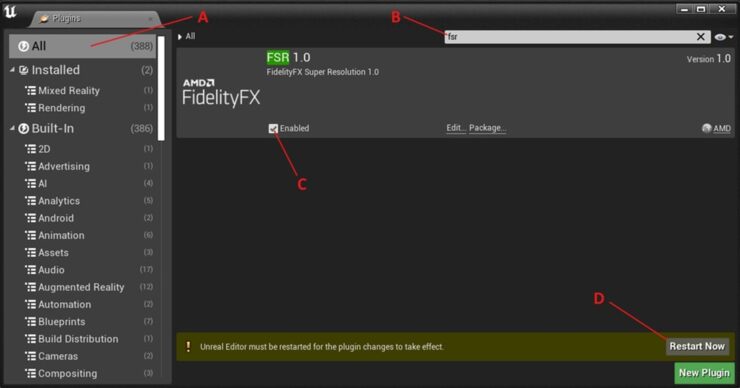
Support for AMD FSR (FidelityFX Super Resolution) is now available directly in Epic’s Unreal Engine thanks to a newly released plugin. Do note that Unreal Engine 4 version 4.27.1 is required to use it.
After the fairly simple installation, game developers will have the following options at their disposal:
FSR 1.0 can be enabled or disabled with the CVar
r.FidelityFX.FSR.Enabled.Upscaling percentage can be tuned with the CVarr.ScreenPercentage. We recommend the following values:
- Ultra Quality :
r.ScreenPercentage 77
Produces an image with quality virtually indistinguishable from native rendering. It should be selected when the highest quality is desired.- Quality :
r.ScreenPercentage 67
Produces a super resolution image with quality representative of native rendering, with a sizeable performance gain.- Balanced :
r.ScreenPercentage 59
Produces a super resolution image approximating native rendering quality, with a major performance gain compared to native.- Performance :
r.ScreenPercentage 50
Visibly impacts image quality and should only be selected in situations where needing additional performance is critical.The UE4 FSR 1.0 plugin requires ensuring that
r.ScreenPercentagemeets or exceeds a minimum value of 50 at all times.Other configurations
CVar Default Value Valid Values Details r.FidelityFX.FSR.UseFP161.0 0, 1 Enables half-precision floating point arithmetic, improving performance without visible artifacts. r.FidelityFX.FSR.EnableFP16OnNvDX110.0 0, 1 Our testing revealed that certain models of NVIDIA GPUs may not produce correct results when running DirectX 11 in conjunction with the FP16 variant of the FSR shaders. If this is resolved in the future, then you may want to use this CVar to re-enable the use of the 16-bit version of FSR on those GPUs. r.FidelityFX.FSR.RCAS.Enabled1.0 0, 1 Robust Contrast Adaptive Sharpening Filter. Sharpens images after upscaling is complete. r.FidelityFX.FSR.RCAS.Denoise0.0 0, 1 RCAS Denoising. Consider enabling for grainy inputs, such as when dithering or film grain effects are applied prior to FSR. r.FidelityFX.FSR.RCAS.Sharpness0.2 [0.0, inf] RCAS Sharpness tuning.
- 0.0: sharpest
- 1.0: 1/2 as sharp
- 2.0: 1/4 as sharp
- 3.0: 1/8 as sharp
etc…
r.FidelityFX.FSR.HDR.PQDitherAmount1.0 [0.0, 1.0] HDR-Only
Dither amount to apply for PQ->Gamma2 conversion, reducing color banding when the output device is ST2084/PQ.r.FidelityFX.FSR.Post.FilmGrain1.0 0, 1 Applies UE4 FilmGrain effects later in the post-processing chain, to avoid conflicts with FidelityFX Super Resolution. r.FidelityFX.FSR.Post.ExperimentalChromaticAberration0.0 0, 1 Be careful!
This feature is Experimental and may produce undesirable results in some situations!
Applies ChromaticAberration effects later in the post-processing chain, to avoid conflicts with FidelityFX Super Resolution.r.FidelityFX.FSR.Debug.ForcePS0.0 0, 1 If enabled, runs FSR and post-FFX ChromaticAberration passes in VS-PS pilelines instead of CS.
Needless to say, this will allow the many Unreal Engine developers to implement FidelityFX Super Resolution more easily into their games, even though it was already far from problematic. There’s already a large list of titles supporting FSR, and it’s destined to grow in the future with the likes of Amid Evil, Asterigos, Century: Age of Ashes, Edge of the Abyss: Awaken, Farming Simulator 22, Forspoken, Ghostrunner, God of War, Hellish Quart, Hot Wheels Unleashed, Iron Conflict, KEO, LEGO Builder’s Journey, Myth of Empires, No Man’s Sky, Raji: An Ancient Epic, Second Extinction, Swordsman Remake, The Elder Scrolls Online, Warface, Warhammer Vermintide II, Workshop Simulator, and X4: Foundations.
The post AMD FSR Support Now Integrated into Epic’s Unreal Engine by Alessio Palumbo appeared first on Wccftech.